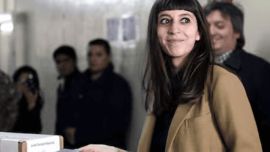Facing mounting piles of credit card debt, unpaid medical bills and private school fees, Argentina’s cash-strapped middle class, much like the State itself, is facing its own debt default.
“We cannot pay everything, we are sinking little by little,” laments Buenos Aires lawyer Mónica, who says she and her accountant husband are overwhelmed by a morass of mounting bills.
Like many of her friends, the 42-year-old says her family maintains its living standards at the price of a mounting credit in a country where annual inflation is running at over 50 percent.
“With no savings, we started to pay for our daily expenses with credit three years ago. In the past, we did that kind of thing to buy Christmas presents, but nowadays we need the card to pay for the electricity, the cellphone, the food, everything,” adds Mónica, who says shame prevents her from giving her full name.
The government imposed currency controls last weekend in what officials said were part of a series of “extraordinary measures” to stabilise a deepening financial crisis. And last week it sought to defer payments of a US$56-billion loan from the International Monetary Fund. The peso fell to record lows last month after business-friendly President Mauricio Macri suffered a thumping defeat at the polls.
Much like the government’s debts, the strategy adopted by middle-class families like Mónica’s has fuelled debts they are finding impossible to repay.
“In the beginning, we paid off all the debt on our card at the end of the month – until we couldn’t. With the usurious rates of interest, we are on the verge of ruin,” she said, shocked by the sudden change.
In order to retain the family car, she had it converted to natural gas – half the price of gasoline. To save on hairstyling bills, she learned how to cut and colour her own hair.
The couple own their own apartment and have jobs in a society with 10 percent unemployment. But the need for credit led the family to request more cards. Currently using five, they are unable to keep up to date with repayments on any of them.
“We owe the psychologist, we are late with the condominium charges and the health insurance. We don’t use supermarkets, we go to wholesale stores instead and we have given up holidays.”
‘Pay and pay again’
Neither she nor her husband are Macri supporters, but an increasingly likely victory for his Peronist opponent Alberto Fernández in the October 27 election gives them little hope of change.
“What are we hoping for? We know it will take us years to get back afloat and get out of debt, and maybe we’ll never get there,” the lawyer said.
Miguel, a 50-year-old office cleaner, has similar debt worries, which he says keep him up at night. “In three years, I took out four loans. Two to pay the credit on my card – which my bank withdrew in the end because I didn’t pay anymore – and two to pay off the initial loan arrears because the interest rates had mushroomed,” he says.
Half his salary of 30,000 pesos (US$508) goes in loan repayments. The plunging peso means his salary is worth half what it was a year ago in dollar terms. To save on transportation costs, he makes part of his daily commute by bicycle.
“That way, I only spend 300 pesos a month, otherwise it would be double,” he says.
No frills
He says he can’t afford even small treats with his wife, who works part time as a child-minder, and teenage daughter.
“We don’t even go to the cinema once a month. We just pay, and pay again,” said Miguel, who lives with his family in his mother’s house.
At least he doesn’t have to pay rent like Claudia, 45.
The company where she worked went out of business in 2017 and she had to move to a studio apartment with her two children.
“I went from managing 40 stores to doing part-time housework,” she says.
She had to take her daughter out of private school last year and put her in a public school with a canteen. “They always let her bring an extra tray home,” she says, embarrassed.
Sometimes, she says, she drinks a glass of sweetened water for dinner, too proud to take the handouts at a social services canteen where her son eats.
“I owe 35,000 pesos (US$580) to the school and 30,000 to the bank,” she says. “I’m broke, just like the country.”
AFP
related news
by Sonia AVALOS


























Comments